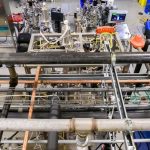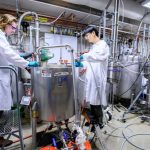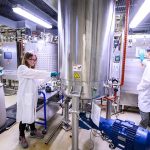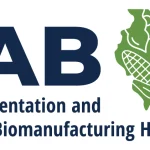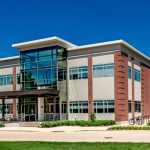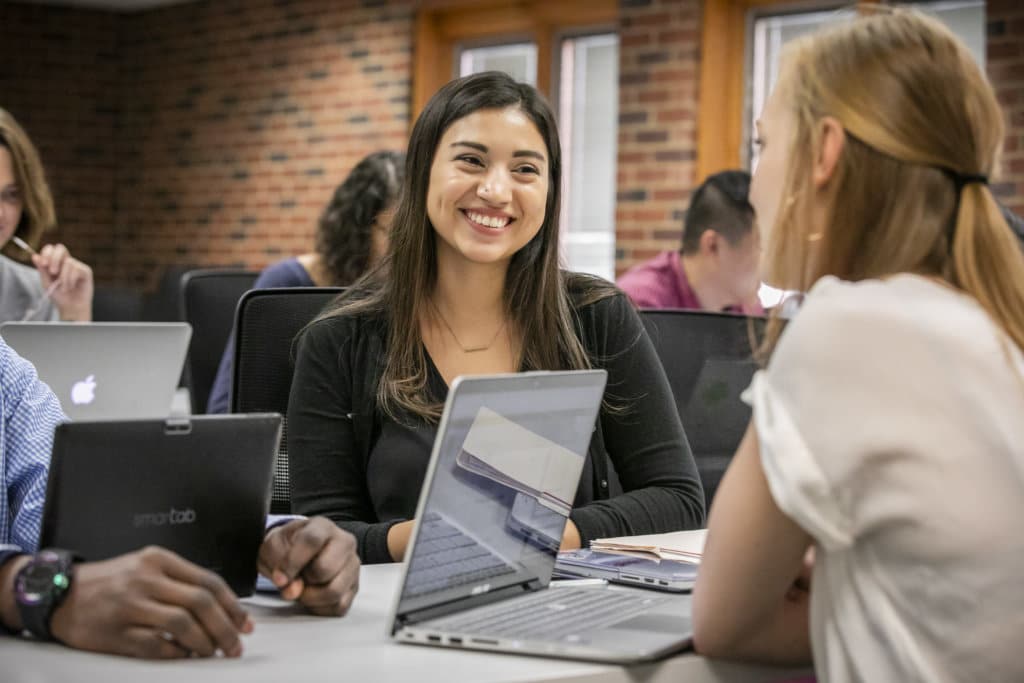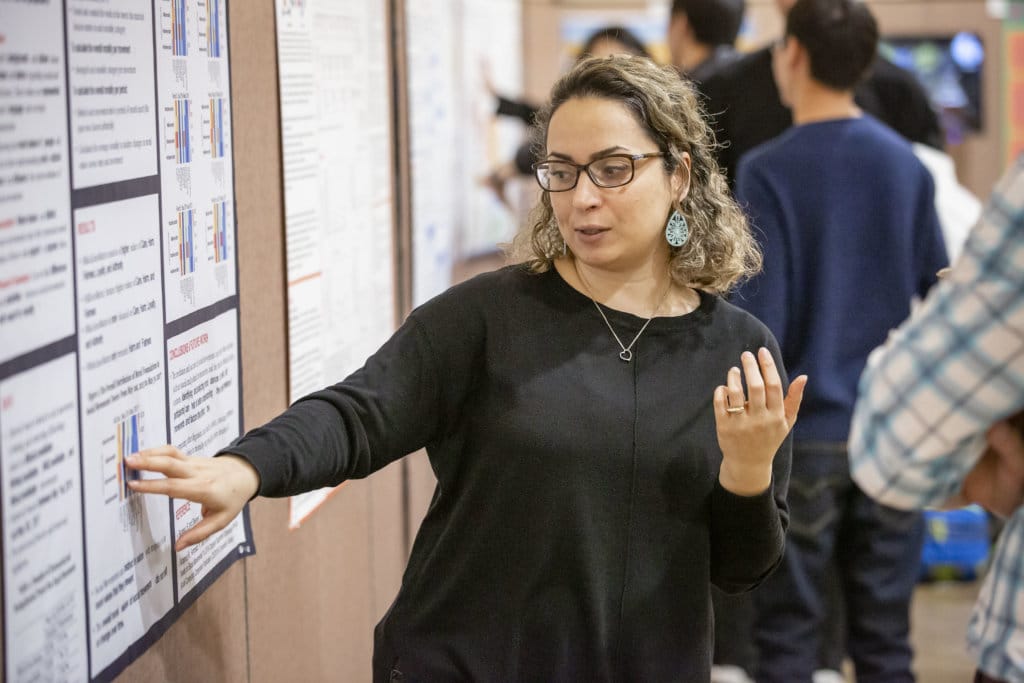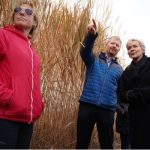Earlier today the DOE announced a five-year extension of funding for the Center for Advanced Bioenergy and Bioproducts Innovation (CABBI), to a total of $262.5 million for the period from 2017 to 2027. CABBI is a collaboration between the university’s Institute for Sustainability, Energy, and Environment (iSEE), the Carl R. Woese Institute for Genomic Biology (IGB), 11 academic departments across the Illinois campus, and 20 partner institutions across the nation.
“To meet our future energy needs, we will need versatile renewables like bioenergy as a low-carbon fuel for some parts of our transportation sector,” U.S. Secretary of Energy Jennifer M. Granholm said in the DOE news release. “Continuing to fund the important scientific work conducted at our Bioenergy Research Centers is critical to ensuring these sustainable resources can be an efficient and affordable part of our clean energy future.”
Andrew Leakey, Professor and Head of the Department of Plant Biology at Illinois, will continue as Director of CABBI, a position he has held since 2020.
“Energy independence has become an increasingly important security issue for the United States, and CABBI will continue to provide breakthroughs toward a new generation of sustainable, cost-effective biofuels and bioproducts that will replace fossil fuel-based products,” Leakey said. “This grant represents a massive investment in CABBI and its diverse team of scientists. We are committed to help push the U.S. toward a new bio-based economy.”
During Phase II, CABBI researchers will continue to develop fuels and products by integrating three highly interconnected DOE priority areas:
- Feedstock Production — Led by Emily Heaton, a Professor of Regenerative Agriculture in Crop Sciences at Illinois, scientists use the “plants as factories” paradigm, in which biofuels, bioproducts, and foundation molecules for conversion are grown directly in crops that are resilient and productive.
- Conversion — Led by Huimin Zhao, the Steven L. Miller Chair in Chemical Engineering at Illinois, experts continue to develop unique tools, yeasts, enzymes, and processing methods to efficiently produce diverse, high-value molecules such as biodiesel, organic acids, jet fuels, lubricants, and alcohols.
- Sustainability — Led by Wendy Yang, Associate Professor of Plant Biology and Geology at Illinois, researchers provide a holistic and systems-based approach to assess the economic and ecological sustainability of CABBI feedstocks, biofuels, and bioproducts from the Feedstock Production and Conversion Themes, at scales that range from the field to the biorefinery to the bioeconomy.
“Our economy and society will be strengthened by enhancing the productivity, resilience and sustainability of our agricultural system,” Leakey said, “and CABBI will help lead the way toward the cutting-edge scientific discoveries and technologies needed to sustainably and profitably produce fuels and chemicals using plants and microbes.”
Madhu Khanna, Alvin H. Baum Family Fund Chair and Director of iSEE and a CABBI Sustainability Theme researcher, said iSEE is excited to support CABBI research in partnership with IGB and with the College of Agricultural, Consumer and Environmental Sciences (ACES) to enable cutting-edge research at the 320-acre Illinois Energy Farm — “a unique living laboratory that enables researchers to grow trials of promising biofuel feedstocks at the field scale” — and other partner sites.
“One of the world’s major challenges is to provide sustainable sources of energy that meet societal needs as the population continues to grow,” Khanna said, “and Illinois is uniquely qualified to help lead that challenge” with the world-class facilities at IBRL and at IGB — the latter of which oversees and integrates CABBI’s core science team under one roof.
Said IGB Director Gene E. Robinson: “The IGB has over 15 years of experience in successfully addressing grand challenges by transdisciplinary integration of the life sciences, physical sciences, social sciences, and engineering, and we are proud to host the CABBI team. Our partnership with iSEE has been a successful one for five years, and we look forward to five more years of breakthrough discoveries.”
Susan Martinis, the Vice Chancellor for Research and Innovation at Illinois and Chair of CABBI’s Governance Board, noted the university’s strong DOE research portfolio, which is regularly among the top five in the nation. The Center is one of four DOE Bioenergy Research Centers (BRCs), joining the Great Lakes Bioenergy Research Center (GLBRC) led by the University of Wisconsin and Michigan State University, the Center for Bioenergy Innovation (CBI) led by the Oak Ridge National Laboratory, and the Joint BioEnergy Institute (JBEI) led by Lawrence Berkeley National Laboratory.
“The unique partnership between our research institutes and interdisciplinary collaboration across academic disciplines are hallmarks of research at Illinois,” Martinis said. “IGB and iSEE have built an infrastructure in fields, labs, and virtual environments to allow researchers to do what they do best: solve the world’s most pressing problems. For the CABBI team, that means uniting experts nationwide in agriculture, engineering, genomics, biology, chemistry, economics, and more to deliver on the promise of bioenergy and bioproducts innovation.”
Phase II partner institutions include Brookhaven (N.Y.) National Laboratory; Lawrence Berkeley National Laboratory in Berkeley, Calif.; Lawrence Livermore National Laboratory in Livermore, Calif.; HudsonAlpha Institute for Biotechnology in Huntsville, Ala.; the U.S. Department of Agriculture’s (USDA) Agricultural Research Service (ARS) in Houma, La., Peoria, Ill., and Urbana, Ill.; Alabama A&M University (new addition for Phase II); Colorado State University; Iowa State University; Mississippi State University; Penn State University; Princeton (N.J.) University; Texas A&M University; University of California-Berkeley; University of Florida; University of Minnesota-Twin Cities; University of Nebraska-Lincoln; the University of Wisconsin-Madison; and West Virginia University.
The Center employs nearly 60 faculty-level researchers — including seven from underrepresented groups who were added since the founding in 2017 — more than 160 postdoctoral researchers and technicians, 90 graduate students, and 50 undergraduates, and 15 support staff. Diversity, equity, and inclusion efforts include a paid summer research internship for undergraduates from underrepresented groups in STEM, and efforts are underway to find corporate and philanthropic funding to expand that program during Phase II.
“One of the best ways for our nation to strengthen our competitiveness with the rest of the world is to enhance the brilliance that already exists right here in Illinois,” U.S. Sen. Tammy Duckworth, D-Ill., said in the DOE news release. “I’m pleased that the University of Illinois at Urbana-Champaign’s Center for Advanced Bioenergy and Bioproducts Innovation will receive this federal funding to help support groundbreaking research on clean energy, create jobs, address climate change and further secure Illinois’s place as a global leader.”
Added U.S. Rep. Nikki Budzinski, D-Ill.: “As a graduate of the University of Illinois and its proud representative in Congress, I’m honored to join Secretary Granholm in announcing $590 million that will benefit bioenergy research at my alma mater. For the last five years, the University of Illinois has done groundbreaking research at the Center for Advanced Bioenergy and Bioproducts Innovation to revolutionize the role of biofuels and agriculture in our 21st century energy economy. I’m so glad to see funding for this project renewed for the next five years, and I look forward to seeing how these resources will benefit family farmers, our environment, and rural communities across central and southern Illinois.”
The BRC Program was established in 2007 and, in total, led to 4,452 peer-reviewed publications, 845 invention disclosures, 715 patent applications, 298 licenses or options, 261 patents, and 22 start-up companies as of August 2022. Learn more at science.energy.gov.


